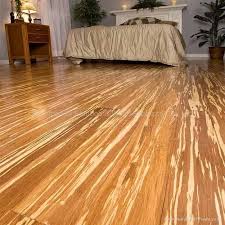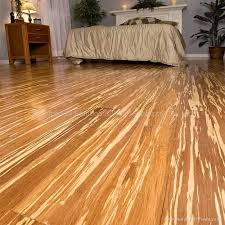Traditional hardwood and bamboo flooring each have their unique appeals. For renovations and new home construction hardwood is among the most preferred of all flooring materials. Hardwood timber is held very high regard due to is warmth, exceptional, unique aesthetics, and the fact that it is highly sustainable and versatile.

However, recently the trends have shifted as bamboo continues to increase in popularity.
Typically bamboo is used for partitions and screens and maybe more commonly in manufacturing furniture and has become a very useful timber flooring product.
Generally speaking, although bamboo is commonly viewed as a timber product, it is actually a tree-like grass. However, don’t be fooled that it is a kind of grass since it is frequently harder than many common species of timber like oak.
When comparing bamboo and hardwood flooring, the key point that you need to understand is bamboo is a weak material on its own.
It is necessary for bamboo flooring to undergo a manufacturing process to make a product that can withstand heavy human traffic volumes, furniture, and other wear and tear as well as points of impact.
How Durable Is Bamboo Hardwood Flooring?
There are two different types of bamboo: horizontal and strand. For commercial and residential properties that experience high levels of foot traffic, strand woven Bamboo is preferred to be used due to its high durability.
Bamboo flooring is sold widely all around the world due to it being an eco-friendly floor product when compared to other hardwoods. Its high stability and durability are other great advantages. Many people doubt how durable and strong bamboo floors are.
Bamboo, after all, is a type of grass and is very thin and soft.
The durability and strength of bamboo floors don’t all come from the original bamboo stalk. To achieve the kind of bamboo flooring product that we all familiar with, bamboo is cut in strips and then laminated to floor planks.
Compared to a majority of hardwood species, laminated bamboo planks feature very high density. Since there are no actual data points or tests for durability, density and hardness data and testing can be used to come to our conclusion on the durability of bamboo.

The Janka rating is one hardness test.
Strand woven Bamboo has a high Janka score that is higher compared to a majority of hardwood species, such as ash and oak. Solid bamboo has a 6.5 score, which is higher compared to all regular hardwoods.
What Is Kind Of Bamboo Flooring The Hardest?
By far the most durable and hardest kind of bamboo flooring is strand woven bamboo flooring.
It has been suggested by some that Natural Bamboo is harder than Red Oak is, whereas carbonized bamboo has a hardness similar to Black Walnut which is a type of soft hardwood. The bamboo with the hardest ranking is strand woven bamboos which as a 250% harder ranking on the Janka Hardness Scale than Red Oak has.
Strand woven Bamboo has a hardness that is similar to Brazilian Cherry. It has very durable and robust characteristics that make strand woven bamboo flooring perfect for both commercial and domestic properties.
Is bamboo flooring also scratch resistant?
Realistically speaking any bamboo or hardwood flooring is quite susceptible to scratches as well as minor scuff marks that come from daily wear and tear. There are hardwood species that have lower Janka hardness ratings compared to Bamboo that might perform better.
One thing about Bamboo is it doesn’t have even hardness qualities over its entire surface, and it is more likely that the surface will dent and scratch as much or maybe even a little more than other types of hardwood flooring.
The only sure way to end up with a durable floor that can meet the demands of daily furniture, pets, and foot traffic is to buy quality products from only reputable floor installation companies and suppliers like Freedom Flooring.
Johnny Vo, who owns and operates Bamboo Flooring Melbourne says “that some stores sell very immature, cheap bamboo flooring that has just a couple of coats of finish and unfortunately give bamboo flooring a very bad name.”
He added, “we tell customers you get exactly what you pay for, and you need to be sure that you compare apples to apples whenever you are purchasing hardwood floor. Educate yourself and ask about the warranties, finishes, and maturity of the bamboo.”
Strand Bamboo Flooring
As previously mentioned, Bamboo is a kind of grass and not an actual wood. Due to that, bamboo is very fibrous which means it has to undergo a manufacturing process to be a flooring product. Regular manufacturing methods laminate the fibers in a horizontal direction on top of one another.
Strand woven bamboo flooring is much more durable compared to horizontal or vertical bamboo flooring because the cross-hatched strands work to hold together the material.
Typically strand bamboo flooring is made through slicing mature bamboo culms or poles into strips. The culms are crosscut to the desired length and then are sliced to create pieces, depending on the desired width before they are woven together. To remove the sugars and starch, the bamboo strips are then boiled in lime or boric acid solution.
This resulting stand woven bamboo block then is milled into woven strands of bamboo flooring planks that have grooves and tongues.
Whenever strand woven bamboo flooring is made out of bamboos, its anti-microbial properties remain which makes bamboo flooring healthier and safer compared to hardwood flooring because it helps to fight pathogens off and is allergen free.
How Thick Is Bamboo Flooring?
There are various thicknesses of strand woven bamboo flooring due to the unique manufacturing process that is used to make it.
Strand woven bamboo gets sliced out of the bamboo block and then pressed using bamboo strips. The standard thickness is 14mm, but bamboo blocks can also be sliced into 10mm, or 12mm flooring to suit the needs of a customer. When it comes to thickness, strand woven bamboo is quite flexible.
Conclusion Of Bamboo Vs. Hardwood
There are two types of bamboo: vertical and strand. A majority of people within the industry claims that the strand kind is a lot stronger compared to traditional bamboo flooring. On the Janka Hardness Scale, a good quality bamboo with a horizontal cut has a 1,450 p.s.i. Rating.
Stranded bamboo gets compress and then is bonded with resins to more than 3,000 p.s.i. Frequently strand woven bamboo is used in high traffic situations like galleries, restaurants, retail stores, etc.
Bamboo has gotten a lot of attention due to its look, although at one time it was only available in caramelized and natural tones. These days, manufacturers offer a wide selection of Bamboo flooring options with numerous textures and stain choices including hand-scraped products that have a hardwood appearance.
Of course, hardwood doesn’t have anything to prove. That is because it has an established reputation for being an aesthetically pleasing and high-quality floor product.
Bamboo and Hardwood both have assumed high profiles in commercial and home building properties. Although Bamboo is still fairly new to householders and builders in Australia, everyone is very familiar with hardwood. It is just as durable and unique as bamboo, and also as green and versatile.